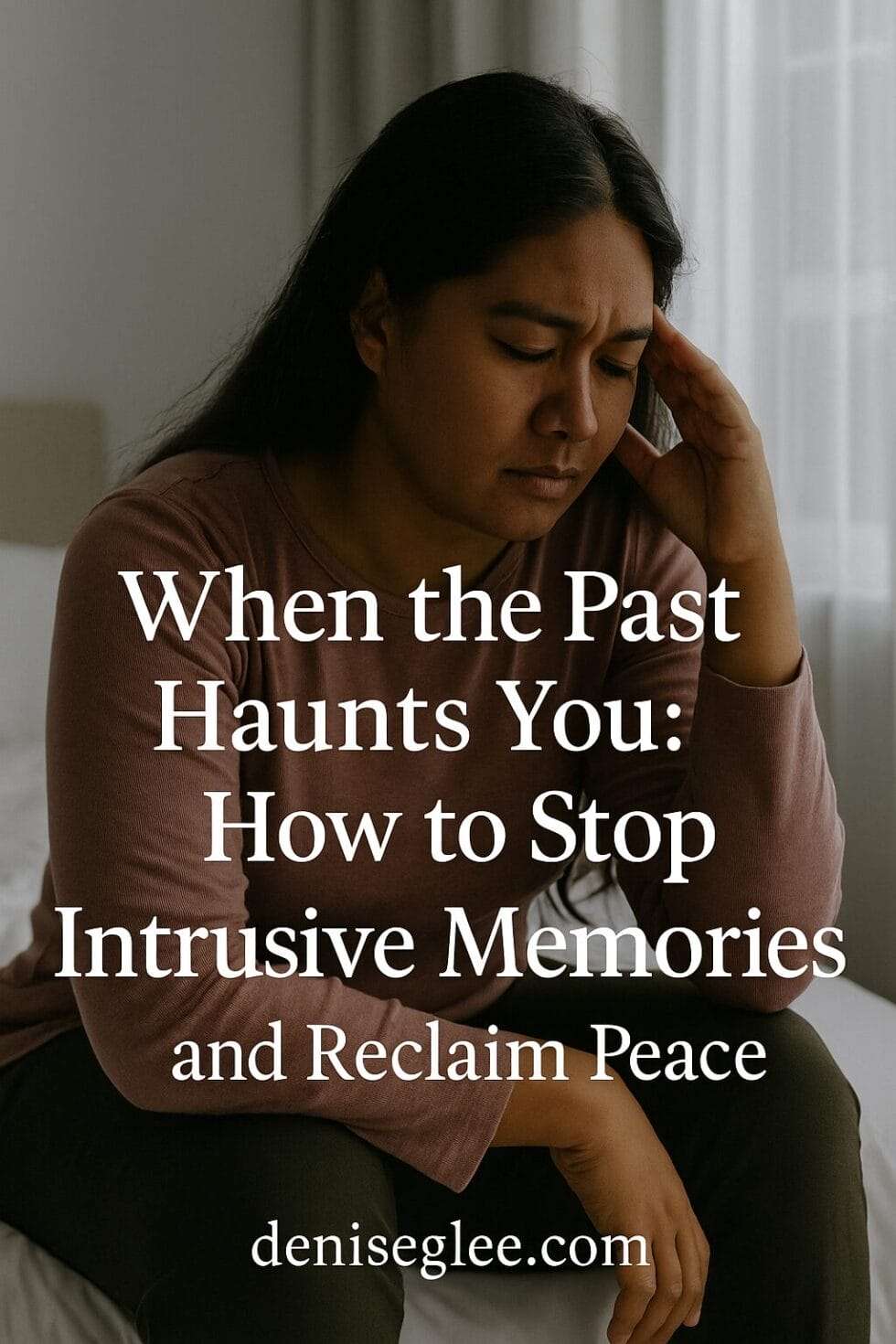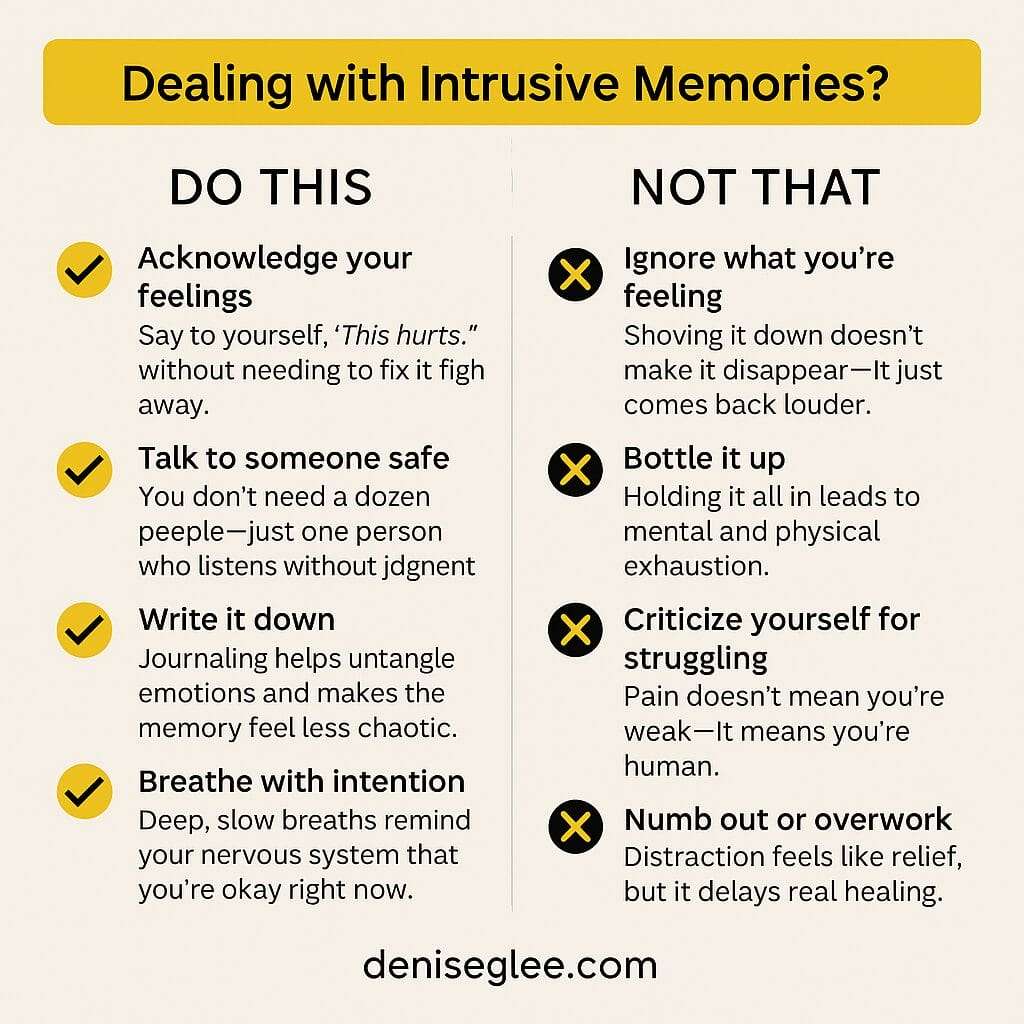
When the Past Haunts You: How to Stop Intrusive Memories and Reclaim Peace
- Updated: April 20, 2025
Hi there! I’m Denise G. Lee, a healing and leadership coach who helps business owners grow without losing themselves in the process.
Today, we’re diving into something that hits hard and unexpectedly: intrusive memories.
What is an intrusive memory? It’s a sudden, unwanted memory—often tied to trauma or emotional pain—that pops into your mind and stirs up intense feelings. It might catch you off guard, trigger old wounds, or throw off your focus.
Sound familiar?
Here’s why this matters.
When intrusive memories show up, they don’t just mess with your emotions—they disrupt your work, your leadership, and your ability to stay present. If you’ve ever felt hijacked by a painful flashback in the middle of a meeting or found yourself spiraling during a slow moment in your day, this article is for you.
Let’s break down why these memories happen, how they affect your work, and what you can do to manage them—without bottling things up or powering through like a robot.
Do you know what happens when you stop trying to:
— Denise G. Lee (@DeniseGLee) July 29, 2024
Work
Have sex
People-please
Avoid
Deny
Suppress
Self-medicate
The pain away?
Simple: You have flashbacks of painful moments from the past.
And it doesn’t even have to occur where you expect, like therapy or counseling.
It can…
Why Dealing with Intrusive Memories is Important for Business Owners

As a business owner, dealing with intrusive memories is crucial for several reasons:
-
Decision Making: Intrusive memories can cloud your judgment and make it hard to make important business decisions. By dealing with these memories, you can think more clearly and make better choices.
-
Focus: When you are preoccupied with intrusive memories, it’s hard to focus on your work. Addressing these memories can help you stay focused and productive.
-
Leadership: Your team looks up to you for guidance and support. If you are struggling with intrusive memories, it can affect your ability to lead effectively. Taking care of your mental health helps you be a better leader.
-
Relationships: Building and maintaining good relationships with clients, partners, and employees is key to a successful business. When you manage intrusive memories, you can interact with others more positively and constructively.
I hope I’ve made the case for why this is important not only for you personally but also professionally. Next, let’s talk about what happens when you decide to deal with painful memories from the past.
What Is an Intrusive Memory?

Imagine you are carrying a ton of stuff. You keep adding more bags every time something bothers you, instead of dropping things and looking at them. Eventually, your hands get so weak and tired that it’s hard to carry anything, and you might even start to feel pain from carrying it all around.
When we try to avoid our feelings by working too much, trying to make everyone happy, or ignoring our emotions, it’s like adding more bags to that load. When we finally stop avoiding our feelings, those heavy bags (or memories) can come rushing back all at once. This is what we call intrusive memories.
When Do Intrusive Memories Happen?
Intrusive memories can show up at any time. They don’t wait for therapy or a safe space.

They tend to sneak up on you during the most ordinary, everyday moments—like when you’re:
-
Reading a book
-
Shopping at the store
-
Mowing the lawn
-
Taking care of your kids
-
Watching a TV show
The other day, I was building a Lego truck with my son. We were just quietly snapping pieces together when, out of nowhere, I got hit with back-to-back memories of being rejected and avoided. I choked back tears as I placed a smiling head on a worker’s body.
That’s the thing about intrusive memories: they don’t ask permission.
They don’t care what you’re doing or how peaceful your day seems.
And that unpredictability? It can be terrifying.
It makes you feel like you’re not in control—like the past is calling the shots.
But please hear me on this: you’re not broken.
Feeling overwhelmed, scared, or disoriented doesn’t mean you’ve failed at healing.
It means your brain is trying—clumsily but honestly—to process something important.
You are not alone in this.
Flashbacks vs. Intrusive Memories: What’s the Difference?
Now, let’s clear up a common point of confusion.
Many people assume that if a memory hits hard, it must be a flashback. But there’s a difference—and knowing which one you’re dealing with can help you navigate it more compassionately.
Intrusive memories are recurring thoughts, images, or feelings that suddenly pop into your mind. They can be vivid, emotional, and disruptive—but you still know where and when you are.
Flashbacks, on the other hand, feel like you’re reliving the event. You might temporarily lose track of the present, experiencing sights, sounds, or sensations as if the past is happening again.
In short:
-
Intrusive memory = mental pop-up
-
Flashback = full-body time warp
Knowing the difference helps you respond with more self-compassion—and choose the right healing tools.

Why Do Intrusive Memories Happen?

Let’s talk a little bit about why this happens. Our brains are like big, amazing computers that store all kinds of information, including memories of things that have happened to us. Sometimes, our brains store memories of events that were really hard or painful. These memories can be stored very deeply, and we might not think about them for a long time.
Intrusive memories often come from traumatic incidents in the past. These could be events that were really scary, upsetting, or hard to deal with. For example, if you were in a car accident, bullied at school, or had a difficult relationship, your brain might store these memories deeply. Later on, when something reminds you of those events, the memories can pop back into your mind.
When we stop avoiding our feelings, our brain might decide it’s time to bring these memories back to the surface. It’s like your brain is saying, “Hey, remember this? We need to deal with this now so we can feel better.” This is a natural process and a way for our brain to help us heal.
Science Behind Intrusive Memories
Intrusive memories and thoughts are a significant aspect of various mental health conditions, including PTSD, OCD, anxiety, and depression.
Brain Chemistry and Structure
Intrusive memories are connected to how well the brain controls and blocks out unwanted memories. A key chemical in this process is Gamma-aminobutyric acid (GABA for short), which helps in the hippocampus, the part of the brain that deals with memory.
When your GABA isn’t working well, the prefrontal cortex (which handles decision-making and control) has a hard time managing the hippocampus, leading to persistent intrusive thoughts. This issue is especially important in conditions like PTSD, schizophrenia, and anxiety disorders, where the hippocampus becomes too active.
Cognitive and Emotional Factors
Intrusive thoughts often come from things that bother our mind or emotions. Survivors of traumatic events or childhood neglect often block out memories or dissociate themselves from the experience.
Stress, not getting enough sleep, and feeling anxious can also make these thoughts happen more often. These thoughts can be upsetting, like violent or sexual ideas, which makes them even more distressing. They usually don’t match what a person believes or values, making them even harder to deal with.
Expert Insights
Michael Anderson, University of Cambridge: “Our ability to control our thoughts is fundamental to our wellbeing. When this capacity breaks down, it causes some of the most debilitating symptoms of psychiatric diseases: intrusive memories, images, hallucinations, ruminations, and pathological and persistent worries. These are all key symptoms of mental illnesses such as PTSD, schizophrenia, depression, and anxiety.”
Jon Abramowitz, University of North Carolina at Chapel Hill: “We all have these thoughts, and for the most part, we don’t really do anything with them. We just kind of say, ‘Oh, that’s a doozy. I don’t want to do that, and I’m probably not going to do it,’ and the thought ends up being like a brain fart—like mental noise.”
How Do Intrusive Memories Feel?

This is the part of the article where you might want to pause and write to me about all the feelings that come up when you’re hit by memories from the past. You might feel a lot of different emotions, like:
-
Anger
-
Sadness
-
Fear
-
Confusion
It can feel like you’re reliving the painful moment all over again. And as distressing as it is, please know that these feelings are okay and normal. I repeat, they are normal. Your brain is trying to process these memories so you can heal and feel better in the long run.
But if those memories feel like they’re looping or hijacking your day-to-day life, you don’t have to untangle it alone.
I work with emotionally aware, high-functioning people who are ready to stop performing and start healing—for real. If that’s where you are right now, let’s talk.
Learn more about working with me »
Examples of Intrusive Memories
Let’s look at some examples to understand better:
-
Example 1: Imagine you had a scary experience with a dog when you were younger. Now, whenever you see a dog, you suddenly remember that scary moment and feel afraid, even if the dog is friendly.
-
Example 2: Suppose you had a really hard time in school with a mean teacher. Years later, when you are reading a book about school, you suddenly remember how upset you felt and start to feel sad again.
-
Example 3: If you are a business owner who once faced a major financial crisis, you might experience intrusive memories when dealing with financial decisions. This can make you feel anxious and affect your confidence in making important choices for your business.
But It Happened So Long Ago…
Many times in the past, I’ve spoken with clients who were told by friends or family to just ignore their painful experiences because “it happened so long ago.” I remember reading the book Psycho-Cybernetics by Dr. Maxwell Maltz, who dedicated a whole chapter to the idea of letting sleeping dogs lie. He said, “These negative experiences do not inhibit, but contribute to the learning process, as long as they are used properly as ‘negative feedback data,’ and are seen as deviations from the positive goal that is desired.”
My goal isn’t for us to relive every single painful memory from the past. That kind of misery could drive us both to despair. What I am talking about is giving yourself permission to deal with all the pain as it comes. In the next section, I’ll share some tips on how to handle these types of memories.
What Can You Do When Intrusive Memories Happen?

Now that you understand what intrusive memories are and why they happen, let’s talk about how to handle them in the moment—without spiraling or shutting down.
Here are a few steps that can help:
1. Acknowledge Your Feelings
It’s okay to feel whatever is coming up. Yes—sit with it. This is the path toward healing unresolved emotional pain. Don’t try to push your feelings away. Instead, notice them and allow them to exist without judgment.
2. Take Deep Breaths
When everything feels tight or overwhelming, pause and breathe. Slow, intentional breaths can help regulate your nervous system and bring you back to the present moment.
3. Talk to Someone You Trust
Reach out to a friend, family member, or therapist. You don’t have to carry this alone. Sometimes just saying “this memory came up again” is enough to break its hold.
4. Write It Down
Grab a notebook or your Notes app and let it spill. Writing can help you process what you’re feeling and uncover what’s really beneath the surface.
5. Do Something Nourishing
Go for a walk. Sketch something silly. Make a comforting meal. Engage in something simple and grounding that reminds your brain and body that you’re safe right now.
I wish I could say that doing these things once will make the memories disappear forever. But intrusive memories aren’t like a one-time sugar crash—you don’t vow to “never do that again” and magically stop encountering them. They have a way of coming back, like that second slice of cake you swore you wouldn’t touch. 🍰
That’s why it’s not just about this moment—it’s about building tools that support you through the next one.
In the next section, we’ll cover what not to do—and what to do—when those memories hit again.
What Not to Do When Intrusive Memories Happen

Before we close, let’s talk about what not to do when those memories hit. It’s just as important as knowing what helps.
🚫 Don’t ignore them
Pretending the memory didn’t happen won’t make it go away. In fact, avoidance usually gives it more power. Facing it gently is the first step toward healing it.
🚫 Don’t isolate yourself
You don’t have to carry this alone. Talking to someone you trust can release pressure and help you feel more supported—sometimes even heard in a new way.
🚫 Don’t shame yourself for struggling
These memories don’t mean something’s wrong with you. They mean your brain and body are asking for care. You’re not weak—you’re human.

You may have done a great job of actively ignoring, denying, suppressing, and intellectualizing the past pain away. Now, use that same energy to embrace, accept, and celebrate how you survived and what you’ve learned about yourself through those experiences.
Denise G. Lee Tweet
Final Thoughts
Intrusive memories can be painful, disorienting, and—at times—relentless. But understanding what they are, why they show up, and how to respond with compassion can make all the difference.
Please remember: it’s okay to have these memories.
They don’t mean something’s wrong with you—they’re part of the healing process.
Don’t numb them out. Suppressing or avoiding emotional pain often leads to addiction, overworking, or other compulsive behaviors that only delay your healing.
And don’t beat yourself up if the same memory resurfaces again (and again).
Just like a diamond has many facets, your mind is layered. Each time a memory returns, it’s giving you another chance to clear away distortions or old beliefs that are keeping you stuck.
If you want support untangling what these memories are trying to tell you—I’m here. Don’t hesitate to message me.
You don’t have to figure it all out on your own. I can help you develop real tools to feel better, think clearer, and show up fully in your personal and professional life.
🎙️ Also, don’t forget to check out this episode from my podcast for more tips and reflections on navigating healing while leading with clarity and confidence.
💛 Thank you for reading—and take good care of yourself. You’re worth it.





